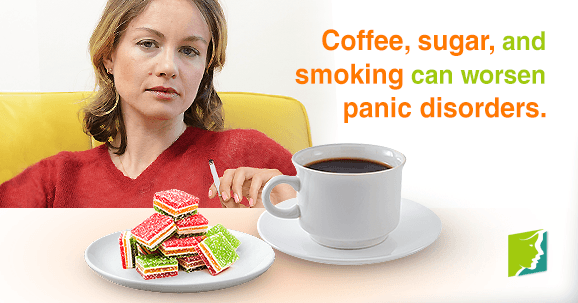For those who deal with panic disorder, every day can be a struggle against anxiety. There are; however, several ways to ease its symptoms with subtle lifestyle changes. Eliminating negative habits, for example, is a great place to start - but which ones will have the most impact once they're given up? Read on to discover five tendencies that can actually worsen the condition.
Morning Coffee
The occasional cup of coffee may not cause serious problems, but caffeinated beverages can worsen anxiety, as the stimulant can cause dangerous highs and lows of energy that induce panic attacks. For this reason, avoiding caffeinated beverages such as coffee, soda, and energy drinks, is highly recommended. Water is a better option for hydration and doesn't cause extreme energy fluctuations.
Sweet Tooth
Foods containing excess sugar are designed to be delicious, but too much of the substance can result in detrimental energy rushes, working similarly to caffeine. Monitoring sugar intake is especially important for women going through menopause, since it can not only worsen panic disorder but also aggravate other menopausal symptoms, contribute to weight gain and eventually create insulin resistance, which sometimes leads to diabetes. Reading package labels is vital to understanding what goes into the body.
Reticence
Panic disorder is a psychological condition as well as a physical one, and an open discussion with loved ones - or at least a trusted medical professional - is essential to proper treatment. Though some may find it difficult to talk about this problem, shutting others out will only exasperate the issue, as it prevents much-needed support. The first step toward relief is often a conversation.
Sedentary Lifestyle
Some individuals who experience panic disorder also suffer from agoraphobia, or a fear of going outside. While it's only human to want to avoid triggering more attacks, lack of activity can only make matters worse. Isolation can sometimes result in depression and alienation from those who want to help. Alternatively, regular exercise releases endorphins and relieves stress, so it can help to manage the problem effectively.
Smoking
Many smokers credit the habit with calming nerves and offering a pleasant buzz, but this practice poses major health risks, including an increase in panic attacks. Its stimulant properties and highly addictive nature induce panic attacks on a regular basis, as well as damage the lungs and respiratory system. While quitting is notoriously difficult, it is ultimately worth the trouble.
Panic disorder does not have to control your life. By implementing the lifestyle changes listed above in combination with a balanced diet and therapy routine, menopausal women - and indeed, all who experience the disorder - can start to regain control. Talk to your doctor today about a plan that you can follow to get back peace of mind as soon as possible.
For further information on how to deal with panic disorder and other menopausal symptoms, click here.
Sources
- American Psychiatric Association. (2012). Panic Disorder. Retrieved September 5, 2013 from http://www.psychiatry.org/panic-disorder
- National Institutes of Health. (2013). Panic Disorder - National Library of Medicine - PubMed Health. Retrieved September 4, 2013 from http://www.ncbi.nlm.nih.gov/pubmedhealth/PMH0001922/


